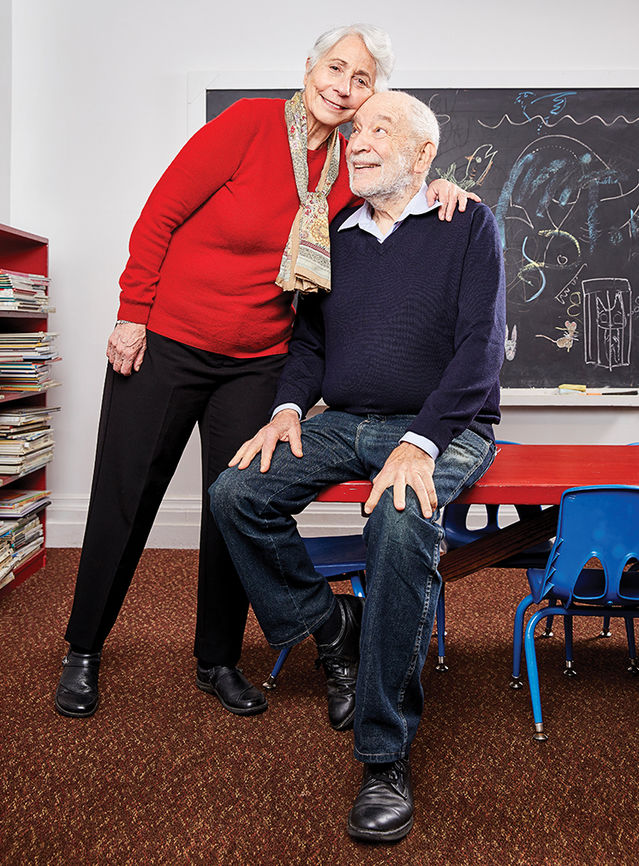The Michelangelo Effect
Your relationship can be a tool that brings out the best in you. Here's how to use your partner—in a good way.
By Sara Eckel published January 2, 2019 - last reviewed on May 21, 2019
Wendy De Rosa was stressed and overwhelmed by her unrelenting workload. She answered emails at the breakfast table, hosted webinars in the evening, and felt frustrated when her partner, James, asked her to log off and enjoy the lunch he made her or take a walk with their young daughter. If only she could enjoy a little downtime. But as the household's primary earner, and a woman who was trying to expand her integrative health business, she didn't see an alternative to her round-the-clock schedule. Meanwhile, James felt neglected when a lovingly prepared meal sat uneaten or was quickly consumed in front of a screen. "I was in a workaholic frenzy, and it felt like he was derailing me," says Wendy, who lives in Boulder, Colorado.
The cycle of mutual resentment escalated until the couple went to a therapist who helped them work through their underlying difficulties—her deep-seated belief that she had to provide for everyone, his abandonment fears. They also found logistical solutions to right their imbalance. James, a native of Costa Rica, was already contributing a lot by handling the bulk of the child care and household chores, but working in uninspiring jobs bothered him. Wendy was able to use her skills in entrepreneurship to help him develop a successful surf camp in his hometown, where the couple now lives half the year. She also started hiring support staff for her business.
Now, rather than depleting each other, the couple has a mutually supportive system, one that involves screen-free mealtimes, morning trail hikes, and two thriving businesses. "Before, I felt that he was another responsibility, even though he was caring for me, too," says Wendy. "I wasn't letting him give to me, but he has taught me how to receive."
Help Me Help You
By acknowledging and accepting each other's help, Wendy and James experienced what University of Pittsburgh psychologist Edward Orehek calls "mutual perceived instrumentality." Orehek's research, with Amanda Forest, indicates that when partners feel instrumental to each other they are more satisfied with their relationship—though he admits that the word instrumental can sound off-putting.
"It can feel callous to see your partner as a tool for what you would like to accomplish," he says. "If you think about using a person to achieve financial success, that can sound cold, but if you think about using a person to feel loved and cared for—think about friends cheering each other on as they run a marathon or siblings embracing each other at a funeral—it starts to sound much more warm and compassionate."
And our partners want to help. Orehek says providing the opportunity to assist you—with advice or other support—can boost your spouse's mood just as much as, if not more than, a gift or other forms of care. "People really want to feel useful in the eyes of others and in their own eyes," says Orehek. "When you're useful to another person, you feel a sense of accomplishment, you feel valuable."
The Michelangelo Phenomenon
Traditionally, research has treated goal pursuit as a solitary endeavor. But everyday experiences show that our relationships can either foster or impede our progress. If you want to wake up earlier each morning, you're better off with a spouse who shuts off his bedside lamp at 10 p.m. If you want to become a vegetarian, your spouse's feelings on tofu versus steak will probably have an impact.
Now researchers are examining that influence. A Washington University study found that being married to a spouse who is highly conscientious—that is, organized and reliable—predicts future job satisfaction and higher income. Research by Wilhelm Hofmann at the University of Cologne in Germany indicates that high relationship satisfaction positively affects feelings of control over goal pursuit. Hofmann posits that the stability of happy relationships makes it easier to focus. According to Hofmann, "When people's everyday life feels stable and predictable, they feel more in control of their ability to pursue their goals."
"We are enormously influenced by the people around us," says Judith Sills, a clinical psychologist in Philadelphia, noting that research on social contagion indicates that an individual's chance of becoming obese or quitting smoking is influenced by the habits of friends and family.
Aaron Ben-Ze'ev, a professor at the University of Haifa and the author of the The Arc of Love: How Our Romantic Lives Change Over Time, says that our partner's beliefs and behavior toward us can bring us closer to the person we would like to become—the "ideal self"—in a process called the Michelangelo Phenomenon. "Just as Michelangelo saw his process of sculpting as releasing the ideal forms hidden in the marble," says Ben-Ze'ev, "close partners sculpt one another to bring each individual nearer to the ideal self, thus bringing out the best in each other. In such relationships, we see personal growth and flourishing reflected in statements like: 'I'm a better person when I'm with her.'"

Pleased to Meet Me
Our partner can also shape us in ways we don't expect. When she was a young woman, Erin White saw herself as sensible and no-nonsense, a follower of rules. A community organizer in Philadelphia, she bought her clothes at thrift shops and lived in a small apartment without cable television or air-conditioning. In restaurants, she stuck with tap water as a matter of course—ordering an iced tea or juice struck her as wildly extravagant.
Then she met her wife, Chris, when she was 23. Chris introduced Erin to an entirely new side of herself: a woman who was romantically attracted to women, she had previously dated only men, and one who also enjoyed expensive champagne and designer lingerie. "I had thought of myself as a particular kind of person, but then I was with her and it turned out that I was slightly different. I was a little bit more adventurous. I was a little bit more vain. I was a little bit more desirous and less well-behaved," says Erin, who now lives in Minneapolis with Chris and their two daughters. "She saw me in a way no one else had seen me before, and I became more of that person."
University of London psychologist Madoka Kumashiro has done extensive research on the Michelangelo Phenomenon and says it is based on "behavioral confirmation" principles, noting for example that teachers' expectations of student achievement have been shown to influence their pupils' academic performance. "If somebody believes something about you, they're more likely to elicit these qualities and characteristics and behaviors from you," she says.
Kumashiro uses the example of a husband who thinks his wife is hilarious—he laughs at her jokes and encourages her to retell them to others. "Over time, the wife might objectively become a funnier person, even when the husband is not around," she says. "She knows the kind of jokes to tell, and she feels more confident in telling them." But if she has a different husband who doesn't think she is that funny—he doesn't laugh at her jokes and might even ask her not to tell them—she might become more timid, even when the husband isn't around.
That doesn't necessarily make this husband a bad partner; he might bring out other aspects of her ideal self, maybe by being hard-working or responsible. Like the sculptor, the partner doesn't create something out of nothing—he or she brings out qualities that already exist. "To effectively sculpt a block of stone, the sculptor must not only understand the ideal form slumbering in the block but must also understand the block per se—what possibilities are inherent in the block and what flaws must be circumvented," says Kumashiro.
"Catching" Another's Traits
Liam Carnahan has always been an extravert. Before he met his boyfriend, Jake, he spent nearly every weekend hanging out with his friends—at parties, barbecues, and brunches. "If a weekend came and I didn't have plans, I would panic," says Liam, the head of a digital marketing department in Sydney, Australia.
After he and Jake got together, Liam happily brought Jake with him. But a month or so into the relationship, Jake told him to go to an all-day barbecue without him. It just wasn't his thing, he explained. Initially, Liam was upset. What was he supposed to tell people? But they eventually made a rule that worked for both of them: Jake will go to any event that Liam says is really important to him, like his birthday, and he won't ask for Jake's attendance more than once a month.
Even better, Liam has discovered a new side of himself: a guy who sometimes likes staying at home. Rather than feeling anxiety when Friday rolls around and he has an empty calendar, Liam now feels excited to spend an entire weekend hanging out with Jake, playing video games or catching up on work. "My productivity is better because I'm not out partying every weekend. Now, I'll spend entire weekends working on my side business, and it has taken off because of it," he says.
Cracking the Whip?
Our partners don't just infect us with particular goals, they also influence how we work at them. Research conducted by Duke University psychologist Gráinne Fitzsimons and Yale psychologist John Bargh found that undergraduate students who were primed to think about their mothers outperformed a control group on a test. Another set of participants were more likely to volunteer for a second study when they were asked to think of a close friend than were those who were primed to think of a co-worker.

However, thinking about a loved one doesn't always mean you'll work harder—a subsequent study by Fitzsimons and Northwestern University's Eli Finkel found that thinking about how their significant other supported a goal made participants less committed to that goal than people in a control group. Calling this phenomenon "self-regulatory outsourcing," the authors theorized that even though it can have negative short-term consequences—like making a partner more comfortable about blowing off the gym—sharing a regulatory system in this way could be ultimately beneficial to partners if it enables them to maximize their self-control resources over time.
Hayley Downs sometimes worries that her husband Marlan's unwavering support can feed her laziness, explaining that he is quick to give her permission to skip her workout when she says she's tired. "He often says, 'You should be tired. You've had a hard day. Why don't you lie down? I'll make dinner.' He's a caretaker, and that tends to play into the not-so-great parts of me that want to relax," says Hayley, an education consultant who lives in Kingston, New York.
Over time, however, Downs has realized that Marlan's gentle disposition is a good counterbalance to her own tendency to be hard on herself. "If I say I'm going to run for two miles, but then run a mile. I'll come home and say, 'I only ran a mile!' And he'll say, 'You ran a mile!' He always looks for my accomplishments." She used to think he was letting her off the hook, but he was actually encouraging her to be kind to herself.
Kumashiro says that in a good relationship, partners can balance out each other's temperaments. A workaholic might want to finish her report before going on a Sunday hike, but she will probably work more effectively during the week if she lets her more easy-going partner convince her to shut her laptop and put on her hiking boots.
Valuing the Skills That Matter (To Your Partner)
When it comes to goals and values, Brooke Williams and her husband Christopher are completely in sync. They both want to enjoy life with their kids, develop themselves as writers, and have a stable income and good health insurance. They're also in complete agreement about what they don't like: household chores. "There are so many things that we want to do every day, but then there are so many things we have to do," she says. "It's a constant negotiation."
To ensure that his drudge work was noted, Christopher employed his skills as a professional marketer, making bold proclamations each time he swept the floor or carried a bag of garbage to the curb. This enraged Brooke, and she discovered many other couples faced similar strife after she published an essay unmasking his self-serving propaganda in The New York Times. "My grandparents had set roles of what they did, and our generation is so different," she says.
A marriage counselor helped them see that they needed a contract, and after dividing ownership of the chores—with Brooke on laundry and Christopher on dishes—they were both able to focus on the ways that their similarities are strengths. Christopher's promotional skills—infuriating when applied to Brand Chris—are extremely helpful when he and Brooke brainstorm snappy headlines for her essays. He understands, in a way only a respected peer can, how to deal with rejections from publishers as well as all the other ups and downs of a writing career. Maybe most important, he was willing to endure some personal embarrassment and support Brooke when she exposed his chore-bragging in a national newspaper. He did this because he sees her as she wants to be seen: a talented writer whose voice should be heard (even at his expense).
When it comes to marketing, Christopher wants to be helpful because this is the skill he values in himself. This distinction is essential. Orehek says the benefits that our partners get from helping us are much stronger in the domains that are meaningful to them, where they want to be valuable. "If your partner loves to cook and you ask him to cook a special meal, he might really benefit from that," says Orehek. "But if that's not a task that he enjoys doing, then it wouldn't have the same benefit."

Getting What You Need
At the same time, not seeking help in certain areas can decrease relationship satisfaction. Andrea Brandt, a psychotherapist who practices in Santa Monica, California, recalls working with a couple in which the husband took pride in being able to fix things around the house. "The wife hadn't really noticed. Her mindset: Just call the handyman. She wasn't aware that this was bothering his ego," Brandt says. By changing that behavior, she was able to honor her husband's contributions.
Most of us aren't good at recognizing the ways our loved ones are instrumental to us, says Orehek. For example, when undergraduates are asked how their parents help them, very few mention anything related to financial support. But after they fill out a survey where they assess parental assistance in various categories—such as health, leisure, and finances—the light bulb goes on. "Once you add that as an option, they of course realize, 'Oh yes, my parents pay my rent,'" he says.
He recommends getting clear on all the things your partner does without your asking (or even thinking about), like mowing the lawn or managing the kids' school paperwork. This can help you develop a deeper appreciation of how your partner is contributing to your growth—and shift the focus away from the stuff you wish she was doing.
For musician Adam Cole, that meant letting go of his desire to hear his wife gush each time he wrote a song for her. "I've written my wife 10 or 12 songs over the years, and she likes them. But time and time again, I'll write a song for her that I think is important but doesn't seem to resonate with her. She appreciates the song, but it doesn't mean to her what writing it meant to me," he says.
His wife's tepid responses frustrated Cole. He was trying to send her a message but she didn't hear it. Then it occurred to him that if he wanted to connect, he might try listening. "I realized that if I want to be loving, then I should take out the garbage when she asks. She sees that as loving in a way that the songwriting isn't," says Cole, who is also the codirector of an art school in Atlanta.
Over time, Cole has come to see the ways that his wife's no-nonsense directness has benefitted him. For example, Cole says that when he gets busy he can become snappy and dismissive with others; his wife's feedback on how this is received has been useful, if a bit painful. "I write songs to help myself grow and develop as a person and to connect with people. So here's my wife connecting with me and helping me develop as a person, but because it wasn't related to the songs, it was harder for me to appreciate," he says.
Bringing a Partner In
In a 2015 paper on goal interdependence, Fitzsimons and Finkel conclude that people are more motivated to work toward a goal when they are joined by others. They cite studies involving teams working together on their weight loss objectives, and participants in a laboratory working on word puzzles.
Involving a partner in your goal pursuit can help bring you closer together and make you more likely to succeed. However, Orehek notes that for it to be a warm interaction—that is, something that makes partners feel valued rather than used—they must feel that they have freely chosen to offer assistance, and their contribution must be recognized.
Couples should also avoid the Pygmalion Phenomenon, where partners foist their own ideals onto a spouse. For example, Sills says that sometimes one partner will declare a goal—say, to stop drinking or eating sweets—for himself, when the real target is the spouse. "It can be implied criticism," says Sills, the author of The Comfort Trap.
Not surprisingly, this kind of goal hijacking is negatively associated with couple satisfaction. A better approach, Sills says, is to find goals that you can both take on as equals: for example, a goal to have at least three family dinners a week, or one in which you're seeking a partner's expertise—say, to help you be more assertive at work or patient with the kids. This, she says, will be far better for harmony than recruiting your partner to police your diet or your attempts to stop smoking. According to Sills, applying expertise is different from nagging.
She adds that partners must also take responsibility for their own ambivalence. "Goals are things we aspire to because they aren't easy. They mean sacrificing something we like. Otherwise it wouldn't be a goal, it would be a habit," she says.
Rather than nagging each other, Orehek says partners are better off finding ways to offer support—say, by watching the kids while the other goes running or creating an energizing play
list for the partner's workout.

Following the Blueprint
The help partners offer each other doesn't necessarily have to be overt; spouses often help each other grow without any conscious effort. Erin White's wife had brought out her adventurous and indulgent sides, but after Erin became a full-time stay-at-home mother to their two daughters, the sober pragmatist returned in full force. This was partly due to the enormous responsibilities that come with raising young children, but she also noticed that her wife didn't completely give herself over to the parenting role. This was partially because Chris, a lawyer, was working full-time to support the family and made space for herself in other ways—riding her bike, taking a Brazilian jujitsu class.
Initially, since motherhood felt all-consuming to Erin, she was annoyed that Chris was retaining these parts of herself. But during a child-free trip to Paris, Erin gained enough distance from her parenting responsibilities to see that rather than resenting Chris, she could follow her lead. "I realized I could just be more like her," she says.
When they returned, Erin started carving out space for herself. She started taking trips alone or with friends, getting a babysitter, and renting office space so she could resume her writing career. She published her first book, Given Up for You.
By emulating Chris, Erin made her wife the expert, which made the situation much less contentious than arguing about who got more alone time. "Your partner can be a blueprint," says Orehek.
And a mirror. Erin says she's not interested in returning to her 25-year-old self. Motherhood has changed her, and she's glad about that. But she's also grateful that Chris never stopped seeing that adventurous young woman, even when Erin was hip deep in onesies and sippy cups. "She still experienced me as the person I was when I was younger. Even as I felt altered by the experience of becoming a mother, I wasn't altered in her eyes in the same way," she says.
Chris's perspective has helped Erin integrate those two selves—wild girl and sensible mom—into a third identity. "I'm not trying to go back to what I was before, and I'm also not staying in the identity of early motherhood," she says. "Now, I'm becoming someone else."
Submit your response to this story to letters@psychologytoday.com. If you would like us to consider your letter for publication, please include your name, city, and state. Letters may be edited for length and clarity.
Pick up a copy of Psychology Today on newsstands now or subscribe to read the the rest of the latest issue.
Facebook Image: Y Photo Studio/Shutterstock
